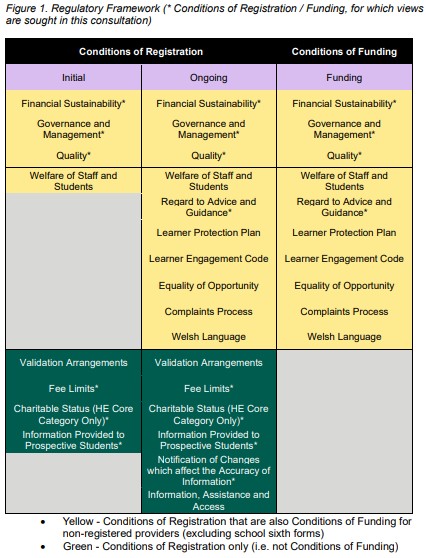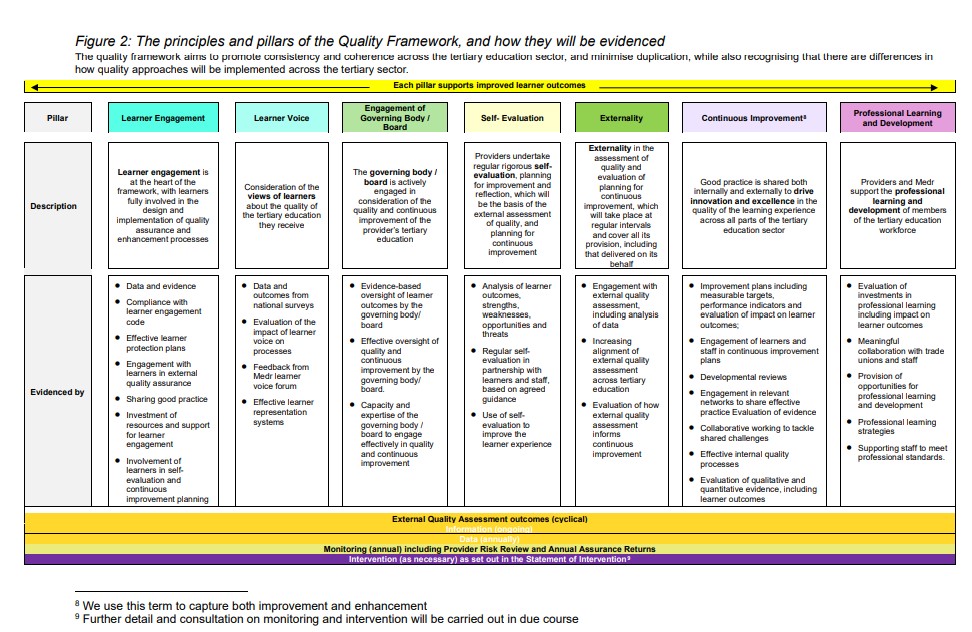Medr, the new-ish regulator of tertiary education in Wales, is consulting on its new regulatory system (including conditions of registration and funding, and a quality framework).
You have until 5pm 18 July 2025 to offer comments on any of the many ideas or potential requirements contained within – there’s also two consultation events to look forward to in early June.
Regulatory approach
As we are already aware from the strategy, Medr intends to be a principles-based regulator (learning, collaboration, inclusion, excellence) but this has been finessed into a regulatory philosophy that:
integrates the strengths of both rules-based (compliance) and outcome-based regulation (continuous improvement)
As such we also get (in Annex A) a set of regulatory principles that can support this best-of-both-worlds position. The new regulator commits to providing clear guidance and resources, transparent communication, minimising burden, the collaborative development of regulations and processes, regular engagement, proactive monitoring, legal and directive enforcement action, the promotion of best practice, innovation and “responsiveness”, and resilience.
That’s what the sector gets, but this is a two way thing. In return Medr expects you to offer a commitment to compliance and integrity, to engage with the guidance, act in a transparent way (regarding self-reporting of issues – a “no alarms and no surprises” approach), practice proactive risk management and continuous improvement, collaborate with stakeholders, and respect the authority of Medr and its interventions.
It’s all nicely aspirational, and (with half an eye on a similar regulator just over Offa’s Dyke) one appropriately based on communication and collaboration. Whatever Medr ends up being, it clearly does not want an antagonistic or suspicious relationship with the sector it regulates.
Getting stuck in
The majority of the rest of Annex A deals directly with when and where Medr will intervene. Are you even a regulator if you can’t step in to sort out non-compliance and other outbreaks of outright foolishness? Medr will have conditions of registration and conditions of funding, both of which have statutory scope for intervention – plus other powers to deal with providers it neither registers nor funds (“external providers”, which include those involved in franchise and partnership activities, and are not limited to those in Wales).
Some of these powers are hangovers from the Higher Education (Wales) 2015 Act, which are already in force – the intention is that the remaining (Tertiary Education and Research Act 2022) powers will largely kick off from 1 August 2026, alongside the new conditions of funding. At this point the TERA 22 powers will supersede the relevant remaining HEW 2015 provision.
The spurs to intervention are familiar from TERA. The decision to intervene will be primarily based on six factors: seriousness, persistence, provider actions, context, risk, and statutory duties – there’s no set weight accorded to any of them, and the regulator reserves the right to use others as required.
A range of actions is open in the event of an infraction – ranging from low-level intervention (advice and assistance) to removal from the register and withdrawal of funding. In between these you may see enhanced monitoring, action plans, commissioned reports and other examples of what is euphemistically termed “engagement”. A decision to intervene will be communicated “clearly” to a provider, and Medr “may decide” to publish details of interventions – balancing the potential risks to the provider against the need to promote compliance.
Specific ongoing registration conditions are also a thing – for registered providers only, obviously – and all of these will be published, as will any variation to conditions. The consultation document bristles with flowcharts and diagrams, setting out clearly the scope for review and appeal for each type of appeal.
One novelty for those familiar with the English system is the ability of the regulator to refer compliance issues to Welsh Ministers – this specifically applies to governance issues or where a provider is performing “significantly less well than it might in all the circumstances be reasonably expected to perform, or is failing or likely to fail to give an acceptable standard of education or training”. That’s a masterpiece of drafting which offers a lot of scope for government intervention.
Regulatory framework
Where would a regulator be without a regulatory framework? Despite a lot of other important aspects in this collection of documents, the statement of conditions of registration in Annex B will likely attract the most attention.
Financial sustainability is front and centre, with governance and management following close behind. These two also attract supplemental guidance on financial management, financial commitment thresholds, estates management, and charity regulation. Other conditions include quality and continuous improvement, regard to advice and guidance, information provided to prospective students, fee limits, notifications of changes, and charitable status – and there’s further supplemental guidance on reportable events.

Medr intends to be a risk-based regulator too – and we get an overview of the kinds of monitoring activity that might be in place to support these determinations of risk. There will be an annual assurance return for registered providers, which essentially assures the regulator that the provider’s governing body has done its own assurance of compliance. The rest of the returns are listed as options, but we can feel confident in seeing a financial assurance return, and various data returns, as core – with various other documentation requested on a more adhoc basis.
And – yes – there will be reportable events: serious incidents that must be reported within five working days, notifiable (less serious) stuff on a “regular basis”. There’s a table in annex B (table 1) but this is broad and non-exhaustive.
There’s honestly not much in the conditions of registration that is surprising. It is notable that Medr will still need to be told about new financial commitments, either based on a threshold or while in “increased engagement”, and a need to report when it uses assets acquired using public funds as security on financial commitments (it’s comforting to know that exchequer interest is still a thing, in Wales at least).
The quality and continuous improvement condition is admirably broad – covering the involvement of students in quality assurance processes, with their views taken into account (including a requirement for representation on governing bodies). Responsibility for quality is expected to go all the way up to board level, and the provider is expected to actively engage with external quality assurance. Add in continuous improvement and an expectation of professional development for all staff involved in supporting students and you have an impressively robust framework.
We need also to discuss the meaning of “guidance” within the Medr expanded universe – providers need to be clear about how they have responded to regulatory guidance and justify any deviation. There’s a specific condition of registration just for that.
Quality framework
Annex C provides a quality framework, which underpins and expands on the condition of registration. Medr has a duty to monitor and promote improvement in the quality and standards of quality in tertiary education, and the option in TERA 2022 to publish a framework like this one. It covers the design and delivery of the curriculum, the quality of support offered to learners, arrangements to promote active learner engagement (there’s a learner engagement code out for consultation in the autumn), and the promotion of wellbeing and welfare among learners.

For now, existing monitoring and engagement plans (Estyn and the QAA) will continue, although Medr has indicated to both that it would like to see methodologies and approaches move closer together across the full regulatory ambit. But:
In due course we will need to determine whether or not we should formally designate a quality body to assess higher education. Work on this will be carried out to inform the next cycle of external quality assessments. We will also consider whether to adopt a common cycle length for the assessment of all tertiary education.
There is clarity that the UK Quality Code applies to higher education in Wales, and that internal quality assurance processes need to align to the European Standards and Guidelines for Quality Assurance (ESG) – external quality assurance arrangements currently do, and will continue to, align with ESG as well.
To follow
Phase two of this series of consultations will come in October 2025 – followed by registrations opening in the spring of 2026 with the register launched in August of that year. As we’ve seen, bits of the conditions of registration kick in from 1 August 2027 – at which point everything pre-Medr fades into the storied history of Welsh tertiary education.












